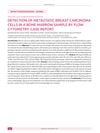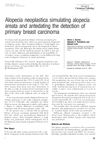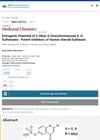 93 citations,
May 2010 in “European Journal of Cancer”
93 citations,
May 2010 in “European Journal of Cancer” BI 2536 had limited effectiveness against several advanced cancers and caused significant side effects.
 December 2021 in “Research Square (Research Square)”
December 2021 in “Research Square (Research Square)” Hair growth-promoting nutraceuticals do not block the cancer-fighting effects of tamoxifen and may enhance its action.
 February 2022 in “Research Square (Research Square)”
February 2022 in “Research Square (Research Square)” Certain nutraceuticals may enhance hair growth without affecting the cancer-fighting properties of tamoxifen.
March 2023 in “JAAD case reports”  45 citations,
January 2020 in “International Journal of Molecular Sciences”
45 citations,
January 2020 in “International Journal of Molecular Sciences” Some natural compounds may help overcome drug resistance in certain cancers, but more research is needed.
23 citations,
December 2013 in “Molecular cancer therapeutics” Breast cancer treatments work better with AR activation, improving results and reducing side effects.
 1 citations,
February 2018 in “Journal of Nursing UFPE on line”
1 citations,
February 2018 in “Journal of Nursing UFPE on line” Hair loss during breast cancer treatment affects each woman differently, influenced by her environment and family.
 February 2013 in “Journal of The American Academy of Dermatology”
February 2013 in “Journal of The American Academy of Dermatology” Hair loss is a common, often overlooked side effect of hormone treatments for breast and prostate cancer.
 March 2010 in “Ejc Supplements”
March 2010 in “Ejc Supplements” CK 5/6 expression in breast cancer is linked to negative hormone receptor status and higher tumor grade.
 1 citations,
April 2019 in “Clinical Breast Cancer”
1 citations,
April 2019 in “Clinical Breast Cancer” Medicines for enlarged prostate may raise the risk of breast growth and tenderness but not breast cancer.
 June 2023 in “Journal of multidisciplinary sciences (Online)”
June 2023 in “Journal of multidisciplinary sciences (Online)” PCOS is linked to a higher risk of endometrial cancer but not ovarian or breast cancer, and more research is needed on its role in cancer development and treatment effects.
 March 2007 in “Journal of Obstetrics and Gynaecology Canada”
March 2007 in “Journal of Obstetrics and Gynaecology Canada” Birth control pills slightly increase the risk of breast cancer, especially if used before the first full-term pregnancy.
 January 2020 in “Mastology”
January 2020 in “Mastology” Flow cytometry was effective in diagnosing metastatic breast cancer in a bone marrow sample.
Hair transplant worked for a patient with a specific scalp condition after breast cancer chemotherapy.
 50 citations,
January 2016 in “The FEBS journal”
50 citations,
January 2016 in “The FEBS journal” RANK is a key target in breast cancer treatment due to its role in tumor growth and bone metastasis.
 30 citations,
February 1994 in “Journal of Cutaneous Pathology”
30 citations,
February 1994 in “Journal of Cutaneous Pathology” A woman's hair loss was initially mistaken for a common hair loss condition but was later found to be caused by breast cancer cells in her scalp.
 451 citations,
March 2005 in “Endocrine Reviews”
451 citations,
March 2005 in “Endocrine Reviews” The enzyme steroid sulfatase is linked to breast cancer and other conditions, and inhibitors are being developed for treatment.
 37 citations,
September 2003 in “Journal of Medicinal Chemistry”
37 citations,
September 2003 in “Journal of Medicinal Chemistry” A substance called Compound 2g can strongly block STS (a hormone-related enzyme) without affecting estrogen levels, making it potentially good for treating breast cancer.
 25 citations,
August 2006 in “Human Reproduction”
25 citations,
August 2006 in “Human Reproduction” Oral contraceptives lower testosterone levels in women, especially those with certain genetic traits, and may be linked to increased breast cancer risk.
15 citations,
March 2018 in “Cancer Medicine” Alopecia areata patients have varied cancer risks, with some cancers being lower and others higher.
 August 2024 in “Research Square (Research Square)”
August 2024 in “Research Square (Research Square)” Using 5-alpha reductase inhibitors may lower the risk of breast cancer in females.
March 2022 in “Proceeding Of Sari Mulia University Midwifery National Seminars” Garlic may help reduce side effects of breast cancer treatments.
 February 2013 in “Journal of The American Academy of Dermatology”
February 2013 in “Journal of The American Academy of Dermatology” Hair loss is a common but often unreported side effect of cancer treatments, especially for breast and prostate cancers.
 January 2022 in “Skin appendage disorders”
January 2022 in “Skin appendage disorders” Finasteride is effective for male hair loss, but it may cause fertility issues, mental health problems, and rarely, breast growth. Regular health checks can reduce the risk of prostate cancer. Patient understanding and involvement in treatment is important.
 January 2016 in “Hair transplant forum international”
January 2016 in “Hair transplant forum international” Finasteride's link to health issues like male breast cancer, infertility, and prostate cancer needs more research through placebo-controlled trials to confirm.
 8 citations,
April 2013 in “Journal of The American Academy of Dermatology”
8 citations,
April 2013 in “Journal of The American Academy of Dermatology” Some breast cancer patients treated with high-dose docetaxel may experience permanent hair loss.
 June 2017 in “Reactions Weekly”
June 2017 in “Reactions Weekly” Some breast cancer treatments caused long-term hair loss in women, similar to a condition called alopecia areata.
 February 2012 in “Community oncology”
February 2012 in “Community oncology” Finasteride for hair loss may increase the risk of certain cancers and has side effects; better regulation and education on its use are needed.
 38 citations,
July 1998 in “Journal of surgical oncology”
38 citations,
July 1998 in “Journal of surgical oncology” A woman with breast cancer developed a rare condition causing excessive fine hair growth on her face and body.
February 2024 in “Indian Journal of Chemistry” Compound N4 effectively kills breast cancer cells and compounds N2 and N3 have strong antibacterial and antifungal properties.























